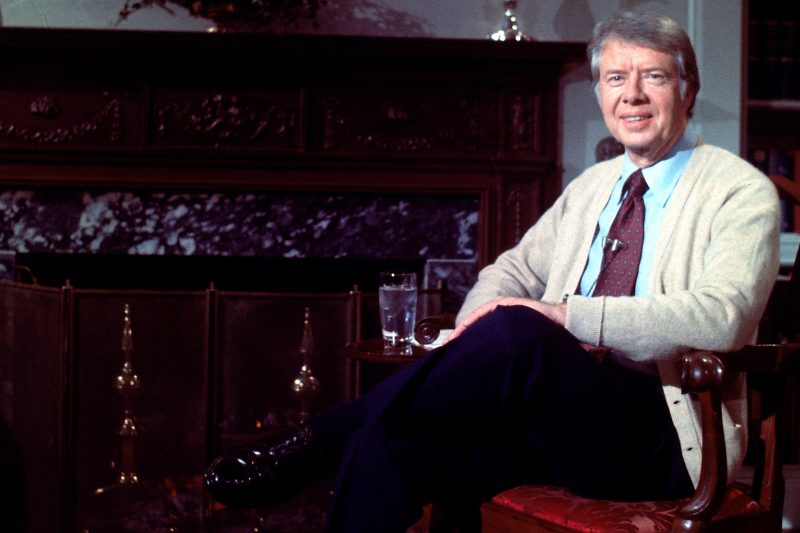October 1, 2024
Jimmy Carter’s Sweater Sparks Decades of Republican Controversy
 Former President Jimmy Carter's decision to wear a sweater during a televised address in the late 1970s may seem like a small and inconsequential event, but it ignited a firestorm of criticism and backlash from Republicans that would have lasting implications for his presidency and beyond.
Carter's choice to don a cardigan sweater while speaking to the nation about the energy crisis faced by the country was meant to convey a message of conservation and energy efficiency. At the time, the United States was reeling from the effects of an oil embargo imposed by OPEC, resulting in long lines at gas stations and soaring energy prices. Carter sought to urge Americans to reduce their energy consumption in order to lessen the country's dependence on foreign oil.
However, the simple act of wearing a sweater would be seized upon by his political opponents as a symbol of weakness and ineffectiveness. Republicans, led by conservative commentators and politicians, pounced on the image of Carter in his sweater as evidence that he was out of touch with the American people and unable to lead effectively.
The mockery and ridicule directed at Carter over his choice of attire became a rallying cry for his detractors, who sought to portray him as a bumbling and ineffective leader. The sweater became a convenient shorthand for all the criticisms leveled against Carter's presidency, from his handling of the economy to his foreign policy decisions.
The backlash against Carter's sweater-wearing moment was amplified by the emergence of a new breed of conservative media outlets, such as talk radio and cable news. These platforms provided a megaphone for critics to lambast Carter and his policies, further eroding his public image and sowing doubt among voters about his ability to lead the country.
In the years that followed Carter's presidency, the image of him in his sweater would be used by Republicans as a cautionary tale of what happens when a leader fails to project strength and resolve. The sweater became a potent symbol of the perceived failures of Carter's presidency, reinforcing the narrative that he was a weak and ineffective leader who was ill-equipped to deal with the challenges facing the country.
Despite his best intentions, Carter's decision to wear a sweater during that fateful televised address would come to symbolize much more than just a call for energy conservation. It would become a lightning rod for criticism and backlash that would shape the perception of his presidency for years to come and serve as a cautionary tale for future leaders about the power of symbols and optics in the political arena.
Former President Jimmy Carter's decision to wear a sweater during a televised address in the late 1970s may seem like a small and inconsequential event, but it ignited a firestorm of criticism and backlash from Republicans that would have lasting implications for his presidency and beyond.
Carter's choice to don a cardigan sweater while speaking to the nation about the energy crisis faced by the country was meant to convey a message of conservation and energy efficiency. At the time, the United States was reeling from the effects of an oil embargo imposed by OPEC, resulting in long lines at gas stations and soaring energy prices. Carter sought to urge Americans to reduce their energy consumption in order to lessen the country's dependence on foreign oil.
However, the simple act of wearing a sweater would be seized upon by his political opponents as a symbol of weakness and ineffectiveness. Republicans, led by conservative commentators and politicians, pounced on the image of Carter in his sweater as evidence that he was out of touch with the American people and unable to lead effectively.
The mockery and ridicule directed at Carter over his choice of attire became a rallying cry for his detractors, who sought to portray him as a bumbling and ineffective leader. The sweater became a convenient shorthand for all the criticisms leveled against Carter's presidency, from his handling of the economy to his foreign policy decisions.
The backlash against Carter's sweater-wearing moment was amplified by the emergence of a new breed of conservative media outlets, such as talk radio and cable news. These platforms provided a megaphone for critics to lambast Carter and his policies, further eroding his public image and sowing doubt among voters about his ability to lead the country.
In the years that followed Carter's presidency, the image of him in his sweater would be used by Republicans as a cautionary tale of what happens when a leader fails to project strength and resolve. The sweater became a potent symbol of the perceived failures of Carter's presidency, reinforcing the narrative that he was a weak and ineffective leader who was ill-equipped to deal with the challenges facing the country.
Despite his best intentions, Carter's decision to wear a sweater during that fateful televised address would come to symbolize much more than just a call for energy conservation. It would become a lightning rod for criticism and backlash that would shape the perception of his presidency for years to come and serve as a cautionary tale for future leaders about the power of symbols and optics in the political arena.
If you would like to delve into the world of investment topics , go to our partner project Wall Street Wizardry


